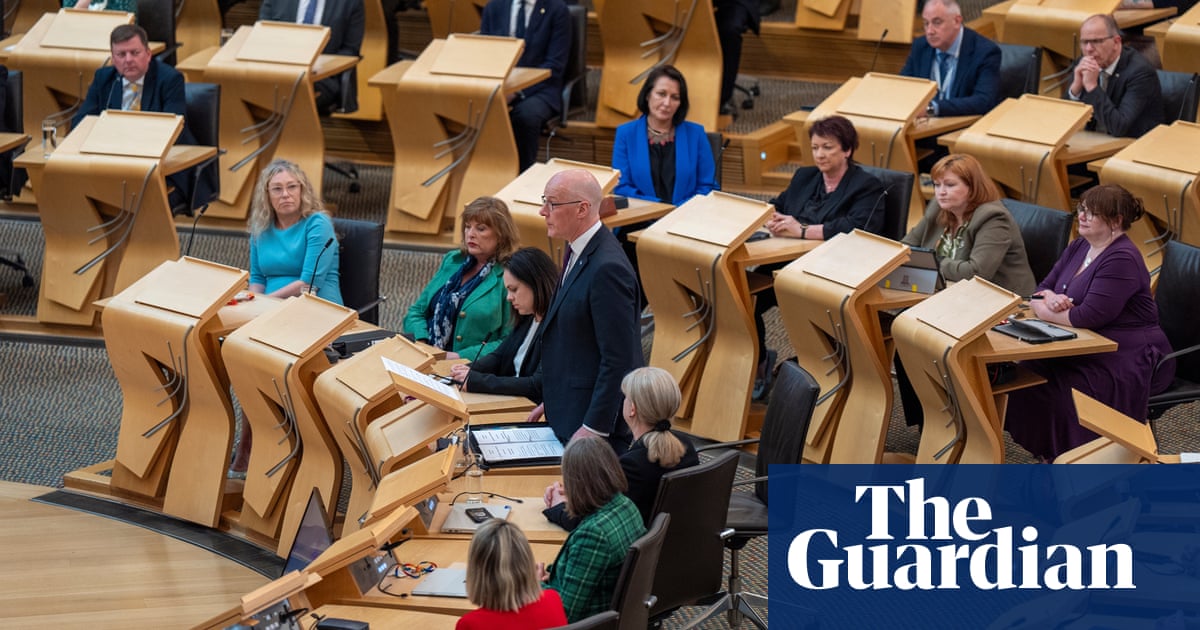The Scottish government has dropped plans to outlaw misogyny and conversion practices before the next Holyrood election, arguing they are too legally complex to deliver in time.
Ministers had long promised a bill to criminalise misogyny after Nicola Sturgeon, the then first minister, accepted recommendations from a working group led by the lawyer and human rights expert Helena Kennedy in 2022.
Lady Kennedysaid a standalone bill was essentialbecause of the seriousness and complexity of the issue, which spanned sexual violence, hatred, gender-based threats of violence online and “incel” culture.
Jamie Hepburn, the minister for parliamentary business, said on Friday the Scottish government would instead insert anti-misogyny measures into Scotland’s Hate Crime and Public Order Act via secondary legislation – an approach Kennedy said in 2022 failed to grasp the significance of the issue.
Women’s rights campaigners said this was “devastating news” but Hepburn said the recentUK supreme court decisionon the definition of woman had added to the legal challenges.
“This is a complex area of policy and law, and it would be necessary that any bill which brought misogyny into criminal law contained clear and unambiguous provisions in regard to the circumstances in which they apply,” he told MSPs.
Sandy Brindley, the chief executive of Rape Crisis Scotland, said those issues should have been resolved by now. “At a time when women and girls are facing unprecedented levels of misogyny, it’s unbelievable that the government is dropping this landmark bill.”
Hepburn also confirmed the devolved government had scrapped its plans toban conversion practicesvia stand-alone Scottish legislation, dropping another of Sturgeon’s pledges when she struck a power-sharing agreement with the Scottish Green party in 2021.
Instead, the Scottish National party government has deferred to the UK government, and will work with UK ministers on agreeing Westminster-led legislation that would include Scottish measures.
Kaukab Stewart, the equalities minister, said if those talks failed or were not trans-inclusive, then ministers in Edinburgh would consider introducing their own bill after next year’s Holyrood elections.
Both decisions signalled another significant shift by the Scottish government under John Swinney’s leadership away from Sturgeon’s rights-focused policy agenda, as the SNP drifts towards safer, centrist territory.
Campaigners against conversion practices reacted furiously. “This is the latest in a growing list of betrayals for LGBTQ+ Scots from this Scottish government. Scotland could have banned conversion therapy years ago,” said a spokesperson for End Conversion Therapy Scotland.
“LGBTQ+ rights are under attack right now, in a way we haven’t seen since Thatcher’s section 28 ban on ‘promoting homosexuality’. Queer people are crying out for some solidarity from politicians. Instead, this news is a stab in the back.”
Stewart said: “Scotland remains absolute in our commitment to equality, the rights of the LGBTQI+ community, and ending conversion practices.
“These recent weeks have been challenging for our LGBTQI+ communities and we want you to know we stand with you and we will work tirelessly to ban conversion practices once and for all.”
Kennedy argued that hate crime legislation was the wrong vehicle for misogyny criminalisation because women were not a minority group, which hate crime protections were designed for.
“Misogyny is so deeply rooted in our patriarchal ecosystem that it requires a more fundamental set of responses,” the working group report concluded. The police and courts needed much clearer legislation, centred on women, to guide them, it said.
